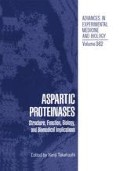Abstract
Flowers of C cardunculus (cardoon) have been used in Portugal since many centuries to make cheese with raw ewe or/and goat milk. Several types of cheeses are well known and highly appreciated for their taste and quality. Examples are Serra, Serpa and Azeitão. The skills of making these artisanal cheeses have been inherited over generations within the same families and are still used today. Farmers collect the mature flowers or upper part of styles during June and July and store them in dry places to be used for clotting of milk during the next seasons, autumn and winter. Traditionally the cheeses are made mainly with fresh ewe’s milk. The proteinases are extracted from flowers with lukewarm water. This extract is filtered through a cloth which contains a spoon of salt. The milk (2–4 1 per cheese) is also passed through the cloth and then left for coagulation during 30–45 minutes. The whey is removed by collecting the curd in another piece of cloth, and afterwards it is brought into shape with a mold. The ripening period is around 6 weeks at 12°C (room temperature in some regions during winter) in a humid and aerated environment.
Access this chapter
Tax calculation will be finalised at checkout
Purchases are for personal use only
Preview
Unable to display preview. Download preview PDF.
References
A.F.L.S. Wiklund, The genus Cynara L. (Asteraceae-Carduae). Bot. J. Linn. Soc. 109:75 (1992).
A.X. Pereira Coutinho, Flora de Portugal (Plantas Vasculares), 2nd Ed. Bertrand (Irmaos) Lda, Lisboa (1939).
J.A. Franco, Nova Flora de Portugal (Continente e Acores) Vol II, Sociedade Astoria Lda, Lisboa (1984).
P. Fevereiro, J.M. Cabral, M.M.R. Fonseca, J.M. Novais, and M.S. Pais, Callus and suspension culture of Silybum marianum biosynthesis of proteins with clotting activity. Biotechnol Lett. 8:19 (1986).
I.M. Tamer, Identification and partial purification of a novel milk clotting enzyme from Onopordum turcicum. Biotechnol. Lett. 15:427 (1993).
C. Christen and E. Virasoro. Présure vegetal. Extraction et proprietés. Le Lait 15:354 (1935).
U. Heimgartner, M. Pietrzak, R. Geertsen, P. Brodelius, A.C. da Silva Figueiredo, and M.S.S. Pais, Purification and partial characterization of milk clotting proteases from flowers of Cynara cardunculus. Phytochemistry 29:1405 (1990).
M. Cordeiro, M.S. Pais, and P.E. Brodelius, Tissue-specific expression of multiple forms of an aspartic proteinase in flowers of Cynara cardunculus. Physiol Plant, 92:645 (1994).
M. Cordeiro, Z.-T. Xue, M. Pietrzak, M.S. Pais, and P.E. Brodelius, Isolation and characterization of a cDNA from flowers of Cynara cardunculus encoding cyprosin (an aspartic proteinase) and its use to study the organ-specific expression of cyprosin. Plant Mol. Biol. 24:733 (1994).
M. Cordeiro, E. Jacob, Z. Puhan, M.S. Pais, and P. Brodelius, Milk clotting and proteolytic activities of purified cynarases from Cynara cardunculus: A comparison to chymosin. Milchwissenschaft 47:683 (1992).
M. Cordeiro, Z.-T. Xue, M. Pietrzak, M.S. Pais, and P.E. Brodelius, Plant aspartic proteinases from Cynara cardunculus spp.flavesens cv. cardoon; Nucleotide sequence of a cDNA encoding cyprosin and it’s organ-specific expression. In: Aspartic Proteinases: Structure, Function, Biology, and Biomedical Implications. (K. Takahashi, ed.) p. 367, Plenum Press, New York, (1994).
J. Tang and R.N.S. Wong, Evolution in the structure and function of aspartic proteases. J. Cell. Biochem. 33:53 (1987).
A. Sali, B. Veerapandian, J.B. Cooper, D.S. Moss, T. Hofmann, and T.L. Blundell Domain flexibility in aspartic proteinases. Proteins 12:158 (1992).
Author information
Authors and Affiliations
Editor information
Editors and Affiliations
Rights and permissions
Copyright information
© 1995 Springer Science+Business Media New York
About this chapter
Cite this chapter
Brodelius, P.E., Cordeiro, M.C., Pais, M.S. (1995). Aspartic Proteinases (Cyprosins) from Cynara Cardunculus Spp. Flavescens Cv. Cardoon; Purification, Characterisation, and Tissue-Specific Expression. In: Takahashi, K. (eds) Aspartic Proteinases. Advances in Experimental Medicine and Biology, vol 362. Springer, Boston, MA. https://doi.org/10.1007/978-1-4615-1871-6_29
Download citation
DOI: https://doi.org/10.1007/978-1-4615-1871-6_29
Publisher Name: Springer, Boston, MA
Print ISBN: 978-1-4613-5761-2
Online ISBN: 978-1-4615-1871-6
eBook Packages: Springer Book Archive

